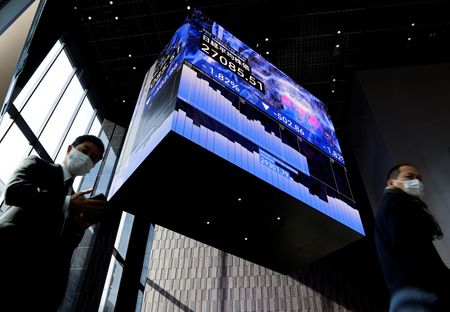
By Kanupriya Kapoor
SINGAPORE (Reuters) – Asian equity markets fought for a footing on Friday, supported by an Amazon-led bounce in U.S futures, but oil’s rise to a seven-year high kept traders on edge over prospects that interest rates will rise to curb global inflationary pressures.
MSCI’s broadest index of Asia-Pacific shares outside Japan ticked up 0.4%, led by a 1.5% rise for the Hang Seng index in its first day of trading after this week’s Lunar New Year holidays. Japan’s Nikkei fell 0.4%.
Overnight the euro posted its sharpest jump in more than a year after European Central Bank President Christine Lagarde left the door open to rate hikes this year and said inflation was running hotter for longer than expected.
The Bank of England raised rates to 0.5% and nearly half its policymakers wanted a bigger increase. The S&P 500 had its worst day in nearly a year. [.N]
“We’re seeing the environment is really changing in terms of central bank stances, which were previously so camped in growth-supportive territory, but now are shifting rapidly to fighting inflation,” said Rob Carnell, chief economist at ING in Singapore.
It follows a hawkish shift in rhetoric at the Federal Reserve over recent months and has applied the blowtorch to bonds and to growth stocks – leaving the likes of Facebook owner Meta Platforms little room to disappoint.
Meta plummeted more than 26% on Thursday, losing more-than-$200 billion of its market capitalisation in what was the largest single day slide in value by a U.S. company. It dragged the Nasdaq down 3.7%, its worst day in 17 months.
However Amazon reported better-than-expected earnings after the bell and the share jumped 17% in after hours trade – driving Nasdaq 100 futures up 1.7% and bolstering sentiment in Asia.
Shares of Snap and Pinterest surged in extended trading, too, following strong quarterly reports, and Twitter also jumped, reversing some earlier losses.
YIELDS JUMP
Still, the backdrop is one of pressure from rising rates which analysts say is unlikely to abate even if U.S. labour data comes in fairly weak later on Friday, as economists expect.
Yields in Europe leapt overnight after the ECB’s hawkish turn, with the yield on benchmark 10-year German bunds up 12 basis points (bps) to an almost three-year high of 0.155%.
Two-year yields rose 14 bps to -0.322%, well above the the ECB’s policy rate of -0.50%. In Britain, bets on more BoE hikes are firming and two-year gilts rose more than 10 bps to an 11-year high of 1.169%. [GB/]
Even anchored Japanese government bonds scaled six-year highs on Friday, taking the five-year yield to zero, as investors girded for the Bank of Japan to follow peers and tighten policy.
Treasuries also sold overnight and were steady in Asia, with the two-year yield at 1.2179% and the 10-year yield at 1.814%. [US/]
In the currency markets, the euro’s surge lifted it to a three-week high of $1.1451 and the dollar index is staring down the barrel of its worst week in nearly two years with a fall of more than 2% over the week so far. [FRX/]
A risk-averse mood has kept a lid on trade-linked currencies, however, and the Australian dollar was last steady at $0.7140 and the kiwi at 0.6673.
U.S. crude was up 0.45% and trading over $90 a barrel for the first time since 2016 as frigid weather threatened to disrupt supply, while Brent was up 0.43% to $91.48 per barrel. [O/R]
(Additional reporting by Tom Westbrook; Editing by Simon Cameron-Moore)

